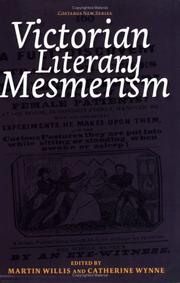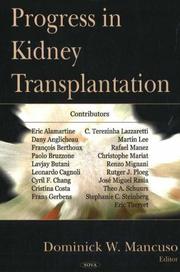| Listing 1 - 10 of 17 | << page >> |
Sort by
|
Book
Year: 2013 Publisher: [Place of publication not identified] : Firenze University Press,
Abstract | Keywords | Export | Availability | Bookmark
 Loading...
Loading...Choose an application
- Reference Manager
- EndNote
- RefWorks (Direct export to RefWorks)
The work analyses the complex relationship between mental illnesses and curative medicine in the writings of E.T.A. Hoffmann, highlighting problems deriving from unsuitable practices, and shedding light on the overwhelming, asymmetric relationship between doctor/patient, man/woman. The work analyses the doubling phenomena arising from the diaries, which Hoffmann overcame determined not to fall into madness; moreover, the author highlights Hofmmann's qualities as a man and a scholar, attentive to the limits of therapies, questioning doctors without understanding. The author summarises Hoffmann's ideas on the libertarian approach to illness, which includes the acceptance of the patient in their whole being, and presents his idea of therapy consisting of interpersonal dialogue and of listening to a story which reflects a similar case. The author also suggests the novelty of the "talking cure" method ante litteram, which was then successfully adopted by psychoanalysis: a method full of ideas, fruitful for literature, from Poe to Schnitzler, and for cinema, from Hitchcock to Kubrick.
Book
ISBN: 1304468143 Year: 2013 Publisher: [Champaign, Illinois] : Sheba Blake Publishing,
Abstract | Keywords | Export | Availability | Bookmark
 Loading...
Loading...Choose an application
- Reference Manager
- EndNote
- RefWorks (Direct export to RefWorks)
Given the rich history of hypnosis, it's surprising that few people actively practice it. There is no real difference between ""hypnosis"" and ""self-hypnosis,"" as all hypnosis is really self-hypnosis: the former is guided with a therapist and the latter is self-administered. However, one can't be hypnotized without one's full participation - thus self-hypnosis is perhaps more valuable, since you can do it at home without paying the 100 an hour to a shrink. Powers' A Practical Guide to Self-Hypnosis offers the basics of the techniques, explains what it is and is not, and how to perform it
Hypnotism. --- Autosuggestion --- Braidism --- Hypnosis --- Trance --- Animal magnetism --- Mesmerism
Book
ISBN: 9780826124876 0826124879 9780826124869 0826124860 Year: 2017 Publisher: New York, NY : Springer Publishing Company,
Abstract | Keywords | Export | Availability | Bookmark
 Loading...
Loading...Choose an application
- Reference Manager
- EndNote
- RefWorks (Direct export to RefWorks)
Hypnotism --- Autosuggestion --- Braidism --- Hypnosis --- Trance --- Animal magnetism --- Mesmerism --- Hypnotism. --- Hypnose.
Book
ISBN: 2100810154 Year: 2020 Publisher: Paris (5 Rue Laromiguière 75005) : Dunod,
Abstract | Keywords | Export | Availability | Bookmark
 Loading...
Loading...Choose an application
- Reference Manager
- EndNote
- RefWorks (Direct export to RefWorks)
Fortement centré sur la pratique, cet aide-mémoire expose également l'état des connaissances actuelles pour chacune des 52 notions qui y sont présentées. La question de la douleur, domaine privilégié du recours à l'hypnose, y est largement traitée.L'aide-mémoire s'articule autour des grands thèmes suivants :- Concepts généraux et aspects méthodologiques- Construction et emploi des métaphores- Troubles de l'enfance et de la petite enfance- Hypnoanalgésie : douleurs aiguës et chroniques et autres situations- Troubles psychopathologiques Public : Psychologues cliniciens, hypnothérapeutes, psychiatres, médecins, paramédicaux.
Hypnotism. --- Autosuggestion --- Braidism --- Hypnosis --- Trance --- Animal magnetism --- Mesmerism

ISBN: 9042020083 9789042020085 9401203016 1429468076 9781429468077 9789401203012 Year: 2006 Volume: 160 Publisher: Amsterdam New York Rodopi
Abstract | Keywords | Export | Availability | Bookmark
 Loading...
Loading...Choose an application
- Reference Manager
- EndNote
- RefWorks (Direct export to RefWorks)
Victorian Literary Mesmerism examines the engagement between literature and mesmerism in Victorian writing. Drawing on recent trends in interdisciplinary literary scholarship the essays collected here investigate the complex connections between scientific mesmerism, its manifestations in the Victorian social and cultural world, and the literary imagination. Here, for the first time, the varied themes and contexts shaped by mesmeric practices are brought together in one volume. Mesmerism's influence on phrenology, medicine and mental health; its interaction with the occult and with communication technologies; the effects of mesmeric principles on gender and sexuality, as well as on criminal behaviour, are all set within the context of literary texts that interrogate and critique mesmerism's influence on the Victorians. This volume will be of interest, therefore, to scholars of Victorian literature and the history of science, as well as to those interested in cultural history with a focus on gender, sexuality, and sciences of the mind.
Mesmerism in literature. --- Mesmerism --- Alternative medicine --- Subconsciousness --- Animal magnetism --- Hypnotism --- Magnetic healing --- Therapeutics, Suggestive --- History

ISBN: 9781608766864 1608766861 9781606927090 1606927094 9781600213120 9781608765140 Year: 2009 Publisher: New York Nova Science Publishers
Abstract | Keywords | Export | Availability | Bookmark
 Loading...
Loading...Choose an application
- Reference Manager
- EndNote
- RefWorks (Direct export to RefWorks)
Hypnotism. --- Trance. --- Hypnotism --- Social Sciences --- Parapsychology & Occult Sciences --- Autosuggestion --- Braidism --- Hypnosis --- Trance --- Animal magnetism --- Mesmerism
Periodical
ISSN: 18392563 Publisher: [Sydney, N.S.W., Australia] Published for the Australian Society for Clinical and Experimental Hypnosis by Sydney University Press
Abstract | Keywords | Export | Availability | Bookmark
 Loading...
Loading...Choose an application
- Reference Manager
- EndNote
- RefWorks (Direct export to RefWorks)
Hypnotism --- Hypnosis. --- Therapeutic use --- Hypnotherapy --- Hypnoanalysis --- Mesmerism --- Hypnotherapies --- Autosuggestion --- Braidism --- Hypnosis --- Trance --- Animal magnetism
Book
Year: 2013 Publisher: Firenze, Italy : Firenze University Press,
Abstract | Keywords | Export | Availability | Bookmark
 Loading...
Loading...Choose an application
- Reference Manager
- EndNote
- RefWorks (Direct export to RefWorks)
The work analyses the complex relationship between mental illnesses and curative medicine in the writings of E.T.A. Hoffmann, highlighting problems deriving from unsuitable practices, and shedding light on the overwhelming, asymmetric relationship between doctor/patient, man/woman. The work analyses the doubling phenomena arising from the diaries, which Hoffmann overcame determined not to fall into madness; moreover, the author highlights Hofmmann's qualities as a man and a scholar, attentive to the limits of therapies, questioning doctors without understanding. The author summarises Hoffmann's ideas on the libertarian approach to illness, which includes the acceptance of the patient in their whole being, and presents his idea of therapy consisting of interpersonal dialogue and of listening to a story which reflects a similar case. The author also suggests the novelty of the "talking cure" method ante litteram, which was then successfully adopted by psychoanalysis: a method full of ideas, fruitful for literature, from Poe to Schnitzler, and for cinema, from Hitchcock to Kubrick.
Book
ISBN: 0398081336 9780398081331 9780398081324 0398081328 Year: 2015 Publisher: Springfield, Illinois
Abstract | Keywords | Export | Availability | Bookmark
 Loading...
Loading...Choose an application
- Reference Manager
- EndNote
- RefWorks (Direct export to RefWorks)
This updated edition of Hypnosis, Dissociation, and Absorption: Theories, Assessment, and Treatment presents the psychological theories and applications of how to use hypnosis with clients who display dissociation, absorption, fantasy proneness, and imaginative capabilities. This second edition adds information on the history of Division 30 (The Society of Psychological Hypnosis of the American Psychological Association). In addition, this new edition presents sociophenomenological, regression, relaxation, and other contemporary theories of hypnosis. This text discusses the clinical implicatio
Mental illness. --- Hypnotism. --- Autosuggestion --- Braidism --- Hypnosis --- Trance --- Animal magnetism --- Mesmerism --- Madness --- Mental diseases --- Mental disorders --- Disabilities --- Psychology, Pathological --- Mental health
Book
ISBN: 022653247X Year: 2018 Publisher: Chicago : University of Chicago Press,
Abstract | Keywords | Export | Availability | Bookmark
 Loading...
Loading...Choose an application
- Reference Manager
- EndNote
- RefWorks (Direct export to RefWorks)
From the 1830s to the Civil War, Americans could be found putting each other into trances for fun and profit in parlors, on stage, and in medical consulting rooms. They were performing mesmerism. Surprisingly central to literature and culture of the period, mesmerism embraced a variety of phenomena, including mind control, spirit travel, and clairvoyance. Although it had been debunked by Benjamin Franklin in late eighteenth-century France, the practice nonetheless enjoyed a decades-long resurgence in the United States. Emily Ogden here offers the first comprehensive account of those boom years. Credulity tells the fascinating story of mesmerism's spread from the plantations of the French Antilles to the textile factory cities of 1830s New England. As it proliferated along the Eastern seaboard, this occult movement attracted attention from Ralph Waldo Emerson's circle and ignited the nineteenth-century equivalent of flame wars in the major newspapers. But mesmerism was not simply the last gasp of magic in modern times. Far from being magicians themselves, mesmerists claimed to provide the first rational means of manipulating the credulous human tendencies that had underwritten past superstitions. Now, rather than propping up the powers of oracles and false gods, these tendencies served modern ends such as labor supervision, education, and mediated communication. Neither an atavistic throwback nor a radical alternative, mesmerism was part and parcel of the modern. Credulity offers us a new way of understanding the place of enchantment in secularizing America.
Mesmerism --- Credulity --- History --- History --- agency. --- animal magnetism. --- antebellum United States. --- belief. --- enchantment. --- mesmerism. --- modernity. --- occult. --- secularization. --- spiritualism.
| Listing 1 - 10 of 17 | << page >> |
Sort by
|

 Search
Search Feedback
Feedback About UniCat
About UniCat  Help
Help News
News